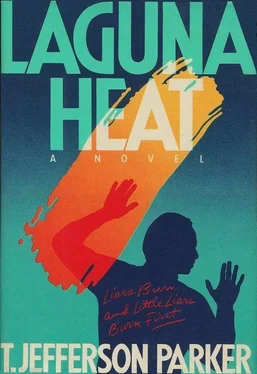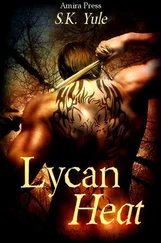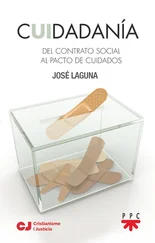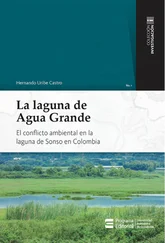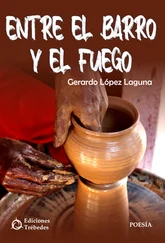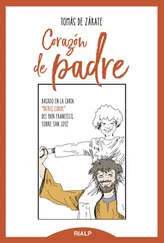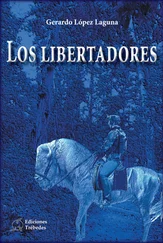Dorothy had just pronounced her judgment on Helene when she was rocked by another spasm of coughing. Shephard wondered for a moment if she would get her breath again. Then, as the silence settled around the table, she brought out another cigarette and accepted the light from Shephard.
“You’re pretty,” she said, as disinterestedly as if she were commenting on the weather, or on a dress. “You looked like a real nervous young man on the tube last night. I flipped channels to compare you to Wade. Well, put it this way, if you’re interested in a broadcasting career, don’t be.” She eyed him lasciviously, which Shephard found unnerving. The wrinkled breasts flattened under her dress as she leaned back for a deep drag on the cigarette.
“I’m just a cop for right now.”
“So,” she continued. “When Burton drowned in the bay one night, the Surfside suddenly had a new partner. Helene and Joe were now in control, and they were delighted.”
Shephard weighed her words against what he knew of human behavior. “Joe and Helene drowned him?”
Dorothy set her drink on the table, fitting the round bottom into an imaginary circle on the wood. “It’s so nice to talk to someone who understands,” she said.
Shephard also weighed her smile against what he knew of human behavior, but nothing came out of it. It was a familiar, knowing smile, but beyond that there was something relieved, almost confessional about it. As he looked again into her eyes, he felt himself in the presence of someone whose life was nothing like his own. She seemed to have orbited elsewhere, seen different places, answered to different codes. He wondered if this was the difference experienced by the rich. But he wondered, too, whether Dorothy Edmond had enough money in her purse to pay for the drinks.
“Joe and Helene drowned him,” she said, repeating his words. Coming from her, they seemed to mean something altogether different. “You see, Helene never really gave a damn about Burton. She and Joe saw the possibility and decided to give it a try. She would pretend love for Burt, and Joe would kill him when the stock was within reach. It wasn’t very imaginative, but it was functional. Joe always had a way with things that worked. That was 1951, if you’re keeping track,” she said. “And it almost didn’t work. You’ll be especially interested in this part, Tom Shephard, both as a man and as a student of murder. That is what you are, right? Burton swam every night, sometimes in the channel in Newport, sometimes south at Diver’s Cove in Laguna.” Shephard imagined the Inside Indicator rough against his hand, the warmth of Jane’s lips as she kissed him there.
“Yes, I’ve been to the cove,” he said.
“Nice place to swim. The plan was to bring some of Joe’s not very respectable friends down from L.A. to do the job. And to do it in the Newport waters where Joe’s friends on the department would be slow to consider it as anything more than an accident. But Joe’s L.A. friends didn’t know the Newport Channel from Minneapolis, and they followed Burton to Laguna one evening and held him under at Diver’s. By the time they got halfway back to L.A. and called in their results to Joe, Burt’s body was floating in unfriendly waters. Of course, one phone call was all it took for Joe to get still another friend — isn’t it interesting how many some people can acquire? — to rescue poor Burton from Diver’s Cove and bring him north to the channel rocks. Those rocks did a nice job of ruining any evidence of struggle. And he was a tough little man, Burton. There must have been quite a struggle.”
She coughed more quietly. Shephard sipped his beer and decided against a cigarette.
“That’s just a little sidelight I thought you’d be interested in,” she continued. “The papers even had hold of it. A couple of service station men recognized Burton as a customer the night he supposedly drowned in Newport. But the Newport cops closed the case, and the Laguna cops had no reason to open it back up in their own front yard. Would you have?”
For the first time, Shephard thought that she was playing with him.
“You might have to,” she said.
“What happened to Helene? Back to New England?”
“Yes. New England. That’s as good a place as any, don’t you think?”
He weighed her words against his own circumstances, trying desperately to get a foothold on the way she thought. To see the world — if even just one corner of it — the same way Dorothy Edmond saw it. Certain images gathered in Shephard’s imagination. The peaceful smile that Dorothy had offered Joe Datilla on the dock, her subservient role as emissary to the fictional bankers, her inviting attitude, the partially exposed breasts. Had she herself been hopeful of Joe’s attentions? Had she perhaps been in love with Burt? Was everything she had said some massive, choreographed lie? The liquor was enough to twist her, he thought.
In times of confusion, Shephard resorted to the obvious: “Tim Algernon and Hope Creeley got burned to death in my city last week. What does all this have to do with them?”
“My, my,” she answered quickly, as if he had just taken a swing at her, “how the young man bucks. I’ll bet you’re a tiger in bed, telling all those little beach girls just where you like it best.”
He tried to think a way into the mind of the woman who sat next to him, but again he could not.
Shephard was never sure if he could have prevented what happened next, or if he had caused it, or if it was simply the last act in a script she’d written — one he couldn’t understand. With one hand Dorothy Edmond snapped her fingers in the air, and the dark-suited man at the bar snaked off his stool and moved toward them. With the other she brought a large white envelope from her purse and handed it to Shephard. It was stiff and heavy.
“A little gift from the personal safe of Joe Datilla,” she said. “Remember the old advice from Plato? ‘Know thyself’?”
He nodded.
“Take it.”
She rose from the booth in a swirl of smoke and lilac perfume, waving an irritated hand at the man who had dropped a fifty-dollar bill on the table and now stood waiting. “Bring the car, David,” she said. “I’m perfectly capable of walking to it myself.”
Then she disappeared unsteadily into the lobby.
In the dim candlelight Shephard examined the contents of the envelope. It contained two items, one a current California license plate — IAEA 896 — the other a check for twenty thousand dollars from Joe Datilla to Wade Shephard. It was canceled and dated September 20, 1951.
Ken Robbins sat amidst the clutter of his forensic lab and grunted off the stool when Shephard walked in. His white smock hung untied around his bulk and was stained with something that Shephard assumed was lunch. Stooped and massive, he looked like a man with scarcely enough energy to hold himself up, but behind his thick glasses Shephard saw the excitement in his eyes.
“Wouldn’t have called you up here on a Saturday, but I got something that won’t translate over the phone.” He shook his big head dramatically. “Those reporters sure gave you a grilling the other night. Thought you handled it okay. Take my advice, though, once you get on their bad side, just quit talking.”
Robbins led Shephard across the lab to a long table that lay against a wall of windows overlooking the smoggy city. In one quick glance, he could see the heart of the county’s government and the bowels of its poverty. To the east, the new Federal Building rose above them, and behind that the tall stiff towers of the jail. The Santa Ana Civic Center sprawled from behind the jail, and in the milky smog that seemed to hover everywhere, the County buildings etched their diminishing outlines against the suburbs. But to the west Shephard saw the gutted remnants at the end of what was once Fourth Street — century-old storefronts, hotels, and restaurants built out of brick that had lost its color. Their facades were festooned with construction company signs that announced the beginning of the end. The destruction had already begun at the north end of the street. Piles of rubble, cordoned off and alive with workers, lay where the old heart of the city had once beat. Farther down the street, Shephard could see the next set of businesses that were doomed, their fronts already so lifeless it looked as if they had given up long ago. Pawnshops, Zapaterias, Joyerias, the Palace Hotel, the Norton, where he had met Little Theodore, cafés, bars. End of a chapter, he thought as he turned to Robbins.
Читать дальше
